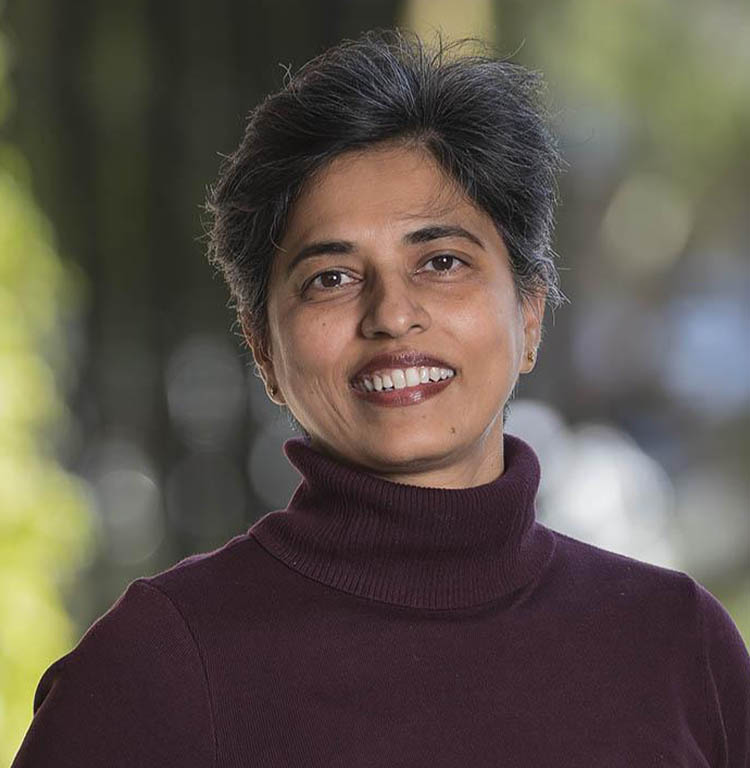
Purnima Madhivanan
Purnima Madhivanan, an associate professor in the Department of Health Promotion Sciences at the University of Arizona Mel and Enid Zuckerman College of Public Health, received a Fulbright-Nehru Distinguished Scholar Award to support her work with women cancer survivors in India.
The Fulbright-Nehru program was created to increase mutual understanding between the people of the U.S. and India. Awards are made to distinguished faculty for a combination of teaching and research activities at an Indian host institution.
“I’m excited to join the long list of Fulbright scholars from the University of Arizona,” Madhivanan said. “As one of the top producers of Fulbrights, the University has a wonderful tradition of global fellowship. That complements the world-class research going on across campus and beyond.”
She said she sees the fellowship as an opportunity to give back to the country in which she was raised.
“One in 10 Indians develops cancer in their lifetime. Breast cancer is the most common type in women, affecting about 26 in every 100,000, while cervical cancer affects about half that number annually. Treatment is improving for both diseases, so it’s important we focus on survivorship as more women return to their lives following cancer,” she said.
“When you think about survivorship in the U.S., there are so many resources. Outside of health care settings in India, those types of services just don’t exist,” Madhivanan added. “We are in the dark ages when it comes to surviving cancer in India and other low- and middle-income countries. This project is really about identifying and building the kind of support services needed for Indian women.”
Madhivanan has received several prestigious awards for her work including the International Leadership Award from the Elizabeth Glaser Pediatric AIDS Foundation and a fellowship from the Fogarty International Center for her research on the epidemiology of herpes type 2 infection in India. This was her first time applying for a Fulbright award.
“I had never considered applying for a Fulbright,” Madhivanan said. “It’s a very prestigious program. More than 60 past Fulbrighters have had Nobel awards. It’s amazing – Aaron Copeland, John Lithgow and Gabby Giffords were all Fulbrighters. Frankly, I’m honored, humbled and surprised I was selected.”
Madhivanan joined UArizona in 2019 and has since served as director of the Global Health Equity Scholars Fellowships, a consortium that supports fellowships for graduate students and postdoctoral researchers at UArizona, the University of California, Berkeley, Stanford University and Yale University. She is currently mentoring six UArizona Fulbright and Fogarty Global Health Equity Scholars fellows who are conducting research in Ethiopia, India, Jamaica, Nigeria and Peru. Last year, she received the Maria Teresa Velez Outstanding Mentorship Award from the University’s Commission on the Status of Women.
In 2005, while doing her doctoral dissertation at UC Berkeley, she became a founding director for the Public Health Research Institute of India and the Prerana Women’s Health Initiative, which provide low-cost, high-quality reproductive health services to more than 50,000 low-income women in Karnataka, India. PHRII has since become a National Institutes of Health-recognized health research and training facility for faculty and students from around the world.
“This Fulbright will allow me to extend research I’ve been doing at the University of Arizona Cancer Center on cancer survivorship. I’ll be working with PHRII, which has strong community networks. We’ll identify a core group of female cancer survivors and build an evidence base for survivorship in India. In addition to PHRII, I’ll be collaborating with the JSS Academy of Higher Education and Research, a premier Indian educational institution that operates a medical school, a public health program and one of the city’s largest tertiary hospitals,” Madhivanan said.
“This study will be one of the first to explore physical and mental health, as well as overall quality of life, among Indian women who undergo cancer treatment. We can’t just extrapolate what already has been done elsewhere. India, after all, is a very different setting.,” she added. “This will be one of the first studies where we’re asking Indian women directly what they need.”
A key study goal will be building public support for improved survivorship services, Dr. Madhivanan said. That effort is based on Madhivanan’s prior research into a community-based participatory research approach known as photovoice. Photovoice is a visual research methodology that puts cameras in participants’ hands to help them reflect on and communicate issues of personal concern while stimulating social change.
The Fulbright Program was created in 1946 with funding from Congress to the U.S. Department of State’s Bureau of Educational and Cultural Affairs to improve mutual understanding among people of the U.S. and other countries. Through it, more than 400,000 students, scholars, teachers, artists and professionals have been afforded the opportunity to study, teach, exchange ideas, conduct research and contribute to solutions to important international challenges.





